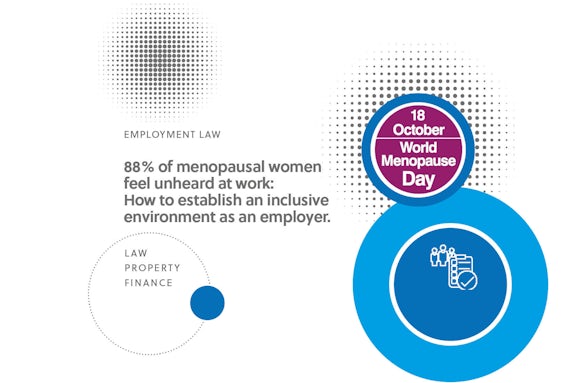A recent survey* of women experiencing menopausal symptoms found that 88% wanted their workplaces to be better set up for menopause colleagues. Therefore, on today’s World Menopause Day, there is perhaps no better time to highlight employer’s legal obligations towards their employees going through the menopause and how best to adopt good working practices.
The menopause will typically affect women between the ages of 45 and 55, accounting for 23% of all women in employment. Perimenopause, which refers to the time during which the body makes the natural transition to menopause, can begin up to 10 years before the menopause affecting women in their mid to late 30s in some cases.
There are up to 48 symptoms associated with each stage of the menopause, but the duration, severity and range of symptoms will vary from person to person. Symptoms can last for several years and can include:
- Hot flushes
- Difficulty sleeping
- Low mood or anxiety
- Problems with memory or concentration
- Headaches
As claims at the employment tribunal relating to the menopause continue to grow, it is more important than ever for employers to be aware of the legal protections in place for those suffering from menopausal symptoms.
What Legal Protections Exist for Employees Affected by the Menopause?
At present, the menopause isn’t specifically listed as a ‘protected characteristic’ in the Equality Act 2010. However, employees who feel that they have been discriminated against in the workplace as a result of the menopause may bring a discrimination claim on the basis of age, sex or disability.
The Health and Safety at Work Act 1974 confers a duty on employers to provide a safe working environment and extends to employees whose working conditions include symptoms of the menopause. Employers must ensure that working conditions do not worsen an employee’s symptoms and should provide support for those experiencing menopausal symptoms in the same way they would with any other health condition.
While employers’ primary focus may be on protecting themselves from potential tribunal claims, given the ongoing recruitment difficulties across various sectors, the prospect of employees leaving work unnecessarily due to lack of workplace support poses additional concerns. BUPA research estimates that nearly 1 million women have been forced out of the labour market due to menopausal symptoms, or perhaps more accurately due to the lack of workplace support for them as they try to manage their symptoms. Therefore, employers will be keen to understand what they can be doing in order to support and retain some of their most experienced and valued staff members.
Recommendations for Employers
There is no legal requirement for an employer to have a workplace menopause policy, however, implementing one may assist in combating the stigma surrounding menopause in the workplace. A menopause policy is useful in raising staff awareness of the menopause and outlining the possible support and procedures available for those affected by it. Creating a workplace culture where employees feel comfortable discussing the menopause encourages staff retention, reduced absence and better workplace performance.
While a dedicated menopause policy would be extremely beneficial, many smaller businesses may not have comprehensive formal written policies. Therefore, incorporating the menopause into an existing sickness policy may be a more practical alternative consideration. Employers may also wish to consider implementing a flexible working policy/arrangement to help those experiencing the menopause to manage their symptoms around their work.
It is recommended that employers provide their managers and senior staff members with sufficient equality and diversity training which covers the menopause and its symptoms. Increasing awareness of the obligations owed to those experiencing symptoms of the menopause is imperative in protecting against any discrimination claims as well as understanding what reasonable adjustments may be made for employees to help manage their symptoms and reduce the impact on their work and wellbeing.
Unless employers make a conscious effort to combat the stigma surrounding the menopause in the workplace and offer reasonable support and adjustments for those affected, they risk losing some of their most valued employees.
If you are considering implementing a menopause policy or have any questions about your responsibilities as an employer, we would be more than happy to assist.
For further information please contact Graham Miller, Partner of Employment Law by email GMillar@gilsongray.co.uk
* Survey Source: Gen M Visibility Report








